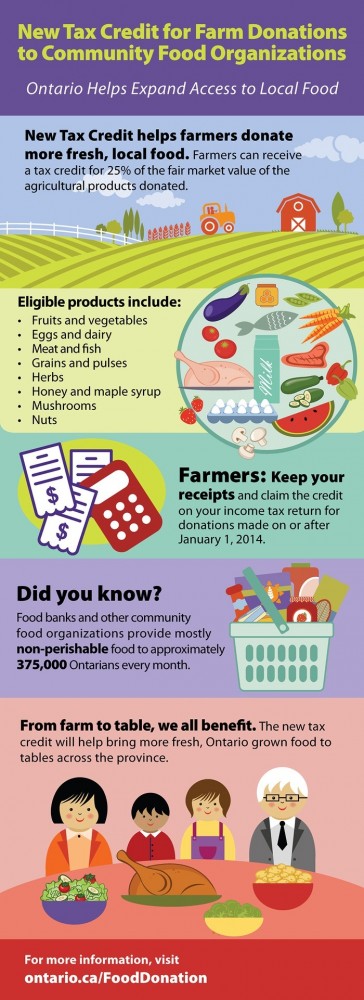Community Food Program Donation Tax Credit – Webinar, Oct. 23rd
Posted: October 1, 2014
Categories: GoodFoodBites / News from Sustain Ontario / Policy News / Webinars
The provincial government has just officially launched the new Community Food Program Donation Tax Credit for farmers who donate agricultural products, such as fruits, vegetables, meat and dairy products, to eligible community food programs (e.g. food banks, student nutrition programs). It is the first of its kind in Canada, and is the result of an amendment proposed by MPP Bob Bailey, and supported by the Ontario Association of Food Banks, as part of the Local Food Act, 2013.
Farmers and farm businesses that donate agricultural products to eligible community food programs will now be eligible for a tax credit of 25 per cent of the fair market value of the donated product. The credit can be claimed for donations made on or after January 1, 2014. If you would like more information on what agricultural products and food programs are eligible, you can read the FAQ prepared by the Ministry of Finance or the final regulation.
Many farmers already donate surplus products or products that cannot otherwise be sold because they are not the right size, shape or colour (but, are still nutritious and of good quality). The Community Food Program Donation tax credit helps to recognize their generosity and hopefully encourages others to do the same by offsetting some of the harvest, storage and transportation costs.
Providing such incentives to help vulnerable members of society access more healthy, local food is a key recommendation of the province’s Healthy Kids Panel, and supports Sustain Ontario’s vision of a healthy, sustainable and equitable food system. It can also help to reduce the amount of good food that is left in the field or thrown away because it does not meet buyer specifications and cannot find a market.
Sustain Ontario is pleased to see that this important element of the Local Food Act, 2013 has been implemented, and that other charitable organizations, such as student nutrition programs, will be eligible to issue receipts for donations. However, there are important policy questions that remain, such as:
- Do eligible community food programs have the tools, resources and capacity to evaluate fair market value of agricultural products?
- How many community programs will be able to take advantage of the credit if they lack the infrastructure to store and handle fresh products?
- Are there opportunities to expand eligibility to processed products such as bread and cheese?
We’ve spent some time highlighting other jurisdictions that offer tax credits and some of the fundamental questions that the implementation of this policy raises in an earlier blog post. Should food banks continue to exist in their current form? Which farmers will actually benefit from a tax credit? How do we address access to healthy food for low income people while paying farmers a decent wage?
Join us for a webinar on October 23rd from 12:00 p.m. to 1:30 p.m to learn more about the tax credit from Senior Policy Advisor from the Ministry of Agriculture, Food and Rural Affairs, Ziyaad Vahed. Ziyaad will be informing us about the program and will be joined by some Sustain Ontario members and allies who will engage us in a thoughtful conversation about what kind of impact this new policy will have on Ontario’s food systems.
Register for the Webinar
 Ziyaad Vahed works as a Senior Policy Advisor with the Economic Development Policy Branch at the Ministry of Agriculture, Food and Rural Affairs. Ziyaad works on a number of policy initiatives that support the agri-food industry including areas such as local food and food processing. He recently worked on developing the tax credit for farmers who donate to community food programs.
Ziyaad Vahed works as a Senior Policy Advisor with the Economic Development Policy Branch at the Ministry of Agriculture, Food and Rural Affairs. Ziyaad works on a number of policy initiatives that support the agri-food industry including areas such as local food and food processing. He recently worked on developing the tax credit for farmers who donate to community food programs.
4 responses to “Community Food Program Donation Tax Credit – Webinar, Oct. 23rd”
Leave a Reply
You must be logged in to post a comment.


Why is the tax credit only 25%? This doesn’t translate into much of an incentive?
Great question. We’ll have to ask the Ministry rep on the webinar.
[…] us for a free webinar this Thursday, October 23rd at 1-2:30p.m. to learn about and discuss the Community Food Program Donation Tax Credit. We will be hearing about the tax credit from Ziyaad Vahed, Senior Policy Advisor from the Ministry […]
[…] webinar discussed details and logistics of the recently introduced Community Food Program Donation Tax Credit, a part of the Local Food Act 2013. This tax credit offers the opportunity for farmers who donate […]